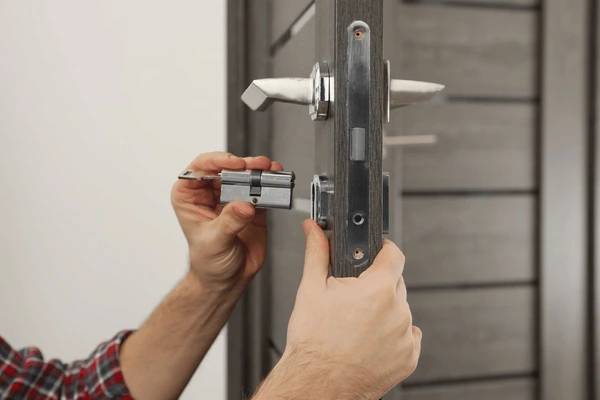Rekey Locks or Change Locks: Which One Should You Choose?
Posted on 10th, Dec 2024
When it comes to securing your home or business, one of the most common decisions you’ll face is whether to rekey your locks or change them altogether. At Locksmith Perth 247, we understand that this choice can be confusing. Both options offer different benefits depending on your specific needs and circumstances.

In this blog post, we’ll explore the differences between rekeying and changing locks, helping you make an informed decision about the best approach for your security needs.
What is Rekeying?
Rekeying involves altering the internal mechanism of a lock so that it works with a new key. Essentially, the lock is reconfigured to prevent the old keys from operating it. This process usually involves replacing the lock’s pins and springs inside the lock cylinder, which means that while the lock itself remains unchanged, the key needed to operate it does.
Benefits of Rekeying:
- Cost-Effective: Rekeying is generally more affordable than replacing the entire lock, especially if the existing lock hardware is still in good condition.
- Convenience: It’s quicker and less disruptive than installing a new lock. In most cases, a locksmith can complete the rekeying process in less than an hour.
- Enhanced Security: If you’ve lost a key or are concerned about unauthorized copies, rekeying ensures that only those with the new key can access your property.
What is Changing Locks?
Changing locks involves replacing the entire lock hardware. This means removing the old lock and installing a new one in its place. This process is more involved than rekeying and can include both the lock mechanism and the associated hardware such as the latch or strike plate.
Benefits of Changing Locks:
- Upgraded Security: New locks can offer better security features compared to older models, including improved resistance to picking, bumping, and drilling.
- Fresh Look: Changing locks provides a chance to upgrade the aesthetic of your door hardware. If your current locks are outdated or worn out, a new lock can enhance both the security and appearance of your property.
- Comprehensive Replacement: If your locks are damaged or have worn out over time, changing them ensures you have a completely new and reliable system in place.
When to Choose Rekeying
Rekeying is often the best option in the following scenarios:
- Lost or Stolen Keys: If you’ve lost your keys or believe they might have been stolen, rekeying your locks will prevent unauthorized access with the old keys.
- Moving into a New Home: When you move into a new house, it’s a good idea to rekey the locks to ensure that previous owners or anyone else with old keys cannot access your home.
- Increased Security Without Replacing Hardware: If your locks are relatively new and in good working condition but you want to enhance security, rekeying is a cost-effective solution.
When to Choose Changing Locks
Changing locks may be the better choice in these situations:
- Damaged or Worn Locks: If your current locks are damaged, malfunctioning, or showing signs of wear, replacing them ensures you have a reliable and secure locking system.
- Upgrading Security Features: If you want to enhance your security with modern locking technology, such as smart locks or high-security locks, changing the locks is necessary.
- Updating the Aesthetic: If you’re renovating or simply want to update the look of your locks, installing new hardware can complement the overall design of your home or business.
FAQs About Rekeying and Changing Locks
1. How much does it cost to rekey a lock compared to changing it?
The cost of rekeying a lock is generally lower than changing the entire lock. Rekeying typically costs between $20 and $50 per lock, depending on the complexity and type of lock. Changing locks, on the other hand, can range from $100 to $300 or more per lock, including the cost of labor and materials. The final price will depend on the type of lock you choose and the complexity of the installation.
2. Can I rekey a lock myself, or should I hire a professional locksmith?
While there are DIY rekeying kits available, it’s generally recommended to hire a professional locksmith for the best results. Locksmiths have the experience and tools needed to rekey locks accurately and efficiently. Improper rekeying can lead to issues with the lock’s functionality or security.
3. How often should I rekey or change my locks?
There’s no set schedule for rekeying or changing locks, as it depends on individual circumstances. Rekeying should be done whenever you have concerns about unauthorized access, such as after losing keys or moving into a new home. Changing locks is recommended if the locks are damaged, outdated, or if you want to upgrade to newer technology.
4. Can all types of locks be rekeyed?
Most standard pin-tumbler locks can be rekeyed, including residential deadbolts and knob locks. However, some specialized locks, such as high-security locks or electronic locks, may require specific procedures or might not be rekeyable. It’s best to consult with a professional locksmith to determine whether your specific locks can be rekeyed.
Your Security is our TOP Priority
Deciding between rekeying or changing locks depends on your specific security needs and the condition of your current locks. Rekeying is a cost-effective and quick solution when you want to enhance security without replacing the entire lock hardware. Changing locks provides a chance to upgrade security features and aesthetics, especially when dealing with damaged or outdated locks.
At Locksmith Perth 247, we’re here to help you with both rekeying and lock replacement services. Whether you’re looking to enhance your home’s security or update your locking system, our expert locksmiths can provide professional advice and reliable service to meet your needs.
If you have any questions or need assistance with your locks, don’t hesitate to contact us at 0427 580 823
